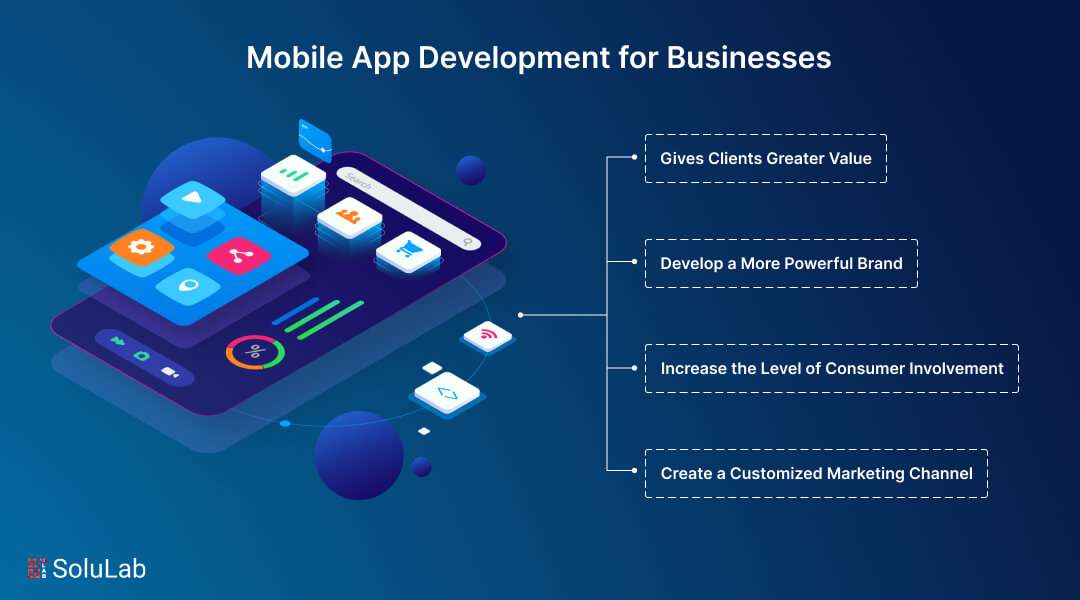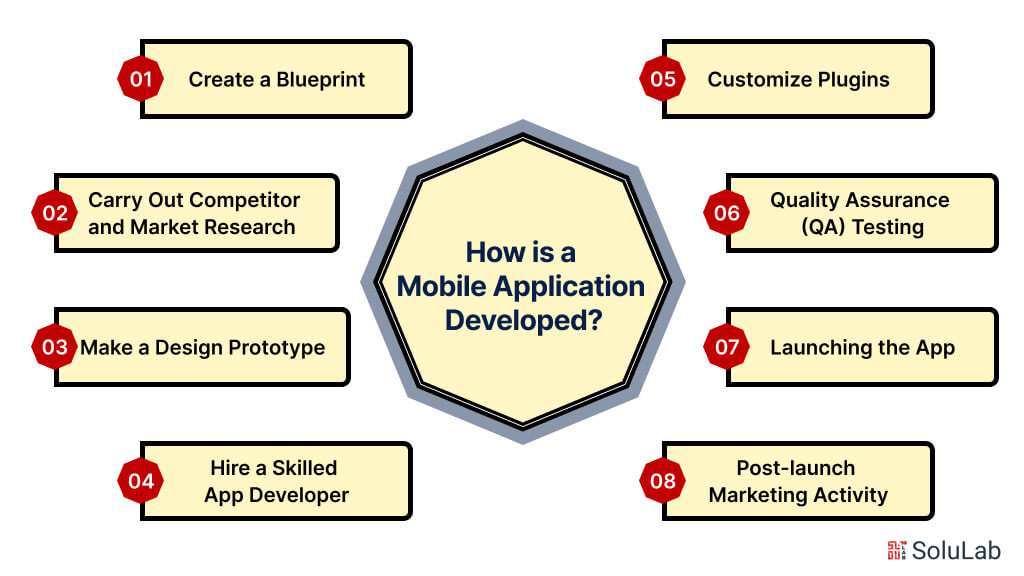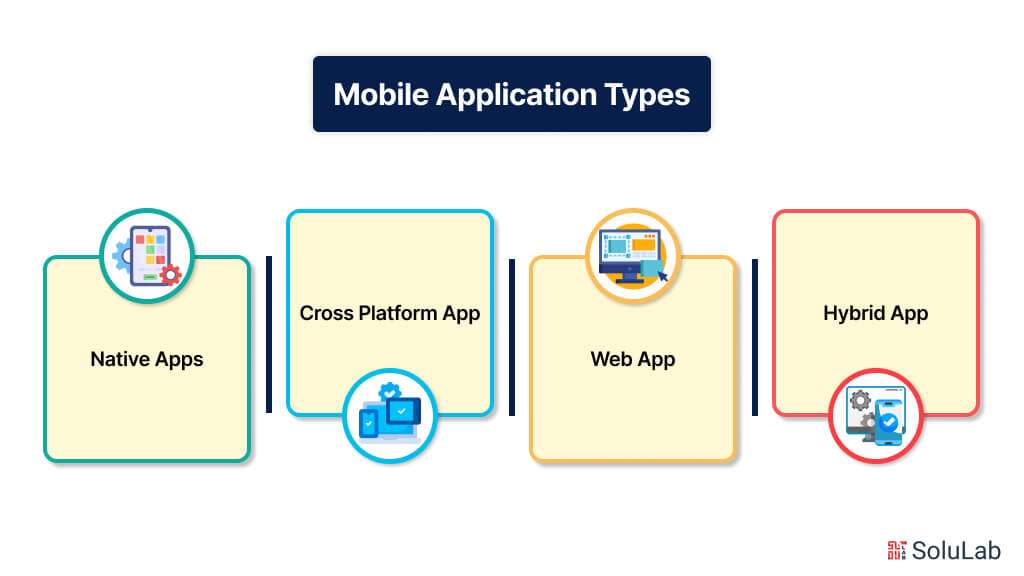
The mobile application development industry is expanding at a rapid pace. In today’s digital market, investing in a mobile app is an excellent opportunity for entrepreneurs and enterprises.
According to Statista, mobile users downloaded around 27.8 billion applications from Google Play in Q3 2021. In comparison, there were around 8.3 billion downloads from the Apple App Store. These figures indicate that the mobile app business will reach new levels of popularity and growth.
We will cover every aspect of mobile app development in this guide, including the many price alternatives and the advantages it offers entrepreneurs and business owners.
What is Mobile App Development?
Mobile app development is the process of producing mobile apps for smartphones. These programs may be preloaded, downloadable from a mobile shop, or accessible via a mobile web browser. A mobile application often communicates with external computing resources via a network connection. Thus, the process of mobile phone app development includes:
- Building installable software packages
- Putting in place backend services via an API, such as data access
- Testing the application on the specified hardware
For mobile apps to be scalable and reliable, you also need to consider screen sizes, hardware requirements, and other factors that affect the app development process.
Advantages of Mobile Application for Business
Whether a company is new or well-established, mobile applications are now essential. As a business owner, you cannot afford to overlook the advantages of mobile application for business. Some of the ways that mobile app development helps businesses are listed below:
-
Give Clients Greater Value
The corporate environment has seen a substantial transformation in recent years. Nowadays, businesses mostly rely on technology to start and finish customer interactions.
Modern technology is not complete without mobile applications, which are revolutionizing the way customers purchase and meet their demands. The rapid progress of technology is accompanied by a rise in customer expectations. These days, mobile applications are a fantastic way to satisfy consumer expectations. Personalization and convenience are highly valued in today’s consumer behavior, and apps provide both at the customer’s fingertips.
-
Develop a More Powerful Brand
Customers get more interested in your brand the more value you provide them with. But without conscious branding efforts, a profound brand experience is unachievable. Here’s where branded mobile applications enter the scene.
Our daily lives are increasingly reliant on mobile apps. This is a route that app owners may use to further their brands. Your app’s influence on brand marketing outcomes will be better the more branding components you include correctly. With this software, you may even gather data to enhance your brand marketing plan and have a deeper understanding of your target demographic.
-
Increase the Level of Consumer Involvement
Increasing client interaction is one of the best strategies to boost revenue creation and brand exposure. You will see a rise in ROI, customer lifetime value, and other critical metrics if you are successful in increasing the frequency with which your customers interact with your brand. Mobile App developers must incorporate specific features if they want to see a rise in user engagement.
The following in-app features can also assist increase consumer engagement: discounts, ongoing feature improvements, and loyalty programs. It’s important to focus on UI/UX design in addition to functionalities. A subpar user interface might force people to uninstall your software in favor of a more superior one.
-
Create a Customized Marketing Channel
The marketing division of a company stands to gain a great deal from the development of a corporate mobile app. The primary benefit that digital marketers experience when companies use mobile applications is having direct access to customer data.
You may greatly benefit from the data gathered from user sessions within the app to enhance your marketing campaigns and efforts. Similar to other traditional marketing channels, an app enables your marketers to offer more targeted and efficient content to customers once they have access to all the data they require.
How is a Mobile Application Developed?

Here are some things to think about before starting the mobile app development process if you’re wondering how to create an app or use one to improve your current company. These actions are essential to your application’s success.
-
Create a Blueprint
The first step in creating a responsive mobile app for your company is to draft a blueprint while considering your vision, goals, and objectives. Consider who you want to target, what you want in your app, and how you want to get there. You can formulate a clear approach after you know precisely what you want.
-
Carry Out Competitor and Market Research
The following stage after defining your goal for creating a mobile app is to carry out in-depth market research, which includes competitive analysis. You may learn about the expectations of your target audience, their pain spots, and how to improve your present strategy by conducting market research.
You may gain a basic understanding of your rivals’ audience targeting strategies, mobile application offerings, and app success rates by analyzing them. You will be able to provide your clients with a one-of-a-kind service by conducting this study and developing an improved edition of the company mobile app with creative initials.
-
Make a Design Prototype
By “prototype design,” we mean that you need to plan out the fundamental layout of your application, choose which components and functions to include, and make sure that all of the features are easy for users to use. Let’s examine the key considerations to keep in mind when developing an app prototype:
1. Plan the App Design: Improved traffic and conversion rates are guaranteed by an appealing app design. A well-thought-out app design also aids in removing any minor bugs before development even starts. This is why many businesses seek professional mobile application design services to streamline their design process. As a result, take the time to create an app layout that is distinctive in its designs and features, attractive, engaging, and fascinating.
2. Work on Wireframes: After you have a basic understanding of your application’s layout, begin developing the features and components you want to add. The layout of the app and its functionality must match. Maintaining a user-friendly interface and interactive features while keeping each page simple and uniform is also crucial.
3. Opt for UI/UX Design: Users notice your app’s appearance right away. For consumers to navigate easily, a user-friendly UI/UX design layout is crucial. Graphical features that are easy to use, interactive, intuitive, and captivating must be incorporated into the User Interface design (UI). In addition, User Experience (UX) refers to the standard of experience you aim to offer your clients, encompassing app load times, and content quality, and it will thus help in the branding of your business.
-
Hire a Skilled App Developer
It’s time to begin the development process after you have a working app prototype and know what features you want in your company’s mobile application. It takes experience, knowledge, and competence in this area to create an app that is captivating, intriguing, and appealing.
You need to find a team with practical expertise in UI/UX design, programming, coding, QA testing, and product management to make sure your app has all the requirements. Therefore, begin recruiting a development team to manage your project based on your needs and financial constraints. You can move forward with the choices listed below:
1. Hire an Internal Development Team: By your terms and conditions, you can appoint an internal development team to collaborate closely with you. The internal development team allows you to save your details. Additionally, you can appoint members based on their qualifications and experience. The important point to notice here is that recruiting an internal development team as a whole might increase costs and take several months. As a result, in this scenario, the entire budget may increase.
2. Work With an App Development Company: Recruiting a highly qualified and experienced mobile app development service is an alternate course of action that you may take to mitigate the problem of investing time and resources into recruiting an in-house team. You can save a tonne of money by working with an app development business instead of hiring and developing an internal staff. You may depend on the development companies for a variety of tasks, including wireframes and app design because they have their own hardworking crew. The app development companies also support you with numerous digital methods to boost exposure, reachability, and conversions while assisting you in minimizing fixed costs.
-
Customize Plugins
As soon as your app is prepared, you may alter its features and appearance to suit your preferences. People are looking for something new, and by utilizing add-on capabilities in your current app, you may use certain Plugins to increase the usefulness of your website. This is how you make a distinctive and eye-catching website that draws in a sizable number of visitors from all around the world.
-
Quality Assurance (QA) Testing
It is advised that you test your software on a range of quality metrics before to its final launch in order to guarantee its stability, functionality, and safety. Your testing team may start the process by including the strategy and the test cases. Your program will be validated and every aspect will be verified by tests like Performance, User Experience, Functionality, Device, and Security testing.
-
Launching the App
Your app is now prepared for release. Depending on the operating system you choose while developing the software, you may submit your finished product to the Google Play Store or the Apple Store. Before submitting your app, make sure you follow each platform’s criteria and synchronize your financial transaction needs with theirs.
As an alternative, you can concurrently submit the same built-up on both platforms if your program is cross-platform. After submitting successfully, give it a few days so that iOS and Android can evaluate and respond. If all goes according to plan, your app will be approved; if not, you may need to follow their recommendations and make the required adjustments.
-
Post-launch Marketing Activity
In order to compete, you must market your software. With more than 3 million apps available in the app store, there’s a good chance that people may never hear of your app if you don’t make an effort to raise awareness of it. There are several approaches to marketing mobile apps.
Pop-up advertisements and other popular applications are one such kind of promotion. An additional strategy for marketing your business app is social media marketing. To raise awareness, word-of-mouth marketing is another effective strategy. It is crucial that the app be downloaded by your intended audience in order to track their behavior, provide exclusive deals to them, etc.
Mobile Application Types

There are several methods for creating mobile applications. You need to consider your vision, goals, and objectives when choosing the strategy. The sort of mobile phone application development you pick will depend on your main goals. Utilizing existing technology and delivering the optimal user experience is essential when choosing the optimal approach. To provide a clear image, let’s talk about a few popular categories of mobile apps:
-
Native Apps
The most popular kind of mobile application designed to run on a certain operating system is a native app. Because the programming language for both operating systems must be created independently, native apps allow the user to concentrate on either iOS or Android OS. The UI designs of Android and iOS differ in a number of ways, so you may make a decision based on your needs.
The goal of creating the app determines which operating system to use. For instance, iOS has the majority of the revenue-generating user base, but Android has the bigger user base. Therefore, it should be mentioned that the native software is limited to operating on Android or iOS.
-
Cross Platform App
A cross-platform app is designed to be published on both Android and iOS at the same time, whereas a native app is focused on either iOS or Android. With the same code, a cross-platform or multi-platform application is created to function flawlessly on every platform. It indicates that all or most of the code sources for the cross-platform app development application may be shared.
Cross-platform applications have several benefits, including reduced development costs, the opportunity to reuse code, a wider client base, increased reach, etc. Slow updates, disparities in app design, and poor quality are a few drawbacks. You must make sure you do adequate research before choosing a platform and have a thorough conversation with your app development service provider in order to minimize the drawbacks of cross-app development.
-
Web App
A web app is a software application that runs via the internet. They don’t need to be downloaded to function because they are kept on distant servers. Compared to other program formations, web application production is more straightforward. The development team can do it within a schedule and money constraints.
The advantages of having a web application are numerous. It doesn’t need to be installed to operate because it can be accessed via a web browser or an internet network. Multiple users can access the same version of the web application simultaneously on any platform, including desktop, laptop, and mobile. Additionally, the web application may be used simultaneously in several browsers to utilize maximum benefits.
-
Hybrid App
A hybrid app combines web and native app functionality into one combined package. The HTML, Javascript, and CSS coding languages are used in the hybrid application. It is compatible with many OS and devices. Finally, the native app is wrapped up using Cordova.
For app creation, a hybrid app is preferable in a number of ways. They require only one code to run on several platforms, making them more economical. It provides a more user-friendly interface and higher quality overall. The hybrid application benefits from cross-platform capability thanks to front-end technology that makes it compatible with several operating systems. These applications may be downloaded and set up on any device; they are easily found in app stores like native apps.
Mobile Development Trends Expected in 2025
Keeping pace with the dynamic era of mobile phone application development, here are the anticipated trends that are set to redefine the industry in 2025:
1. Embracing 5G Capabilities: Developers will focus on optimizing apps to leverage the benefits of 5G networks, enabling features like real-time data streaming and immersive experiences.
2. Expansion of AR and VR Applications: AR and VR technologies will extend beyond entertainment, finding utility in industries such as retail, healthcare, and education to enhance user engagement.
3. Integration of AI and ML: Expectations include AI-driven features such as personalized recommendations and virtual assistants to enhance user experience and support.
4. Rise of Progressive Web Apps (PWAs): PWAs will gain momentum for providing native app-like experiences through web browsers, offering offline functionality and cross-platform compatibility.
5. Adoption of Voice User Interface (VUI): Voice-controlled apps will become more prevalent, catering to the growing reliance on voice assistants for seamless interactions.
6. Focus on Security and Privacy: Developers will prioritize implementing robust security measures to safeguard sensitive user data and ensure compliance with regulations.
7. Designing for Foldable and Dual-Screen Devices: With the emergence of foldable and dual-screen devices, apps will be designed to adapt to various screen configurations for optimal user experiences.
8. Growth of Instant and Mini Apps: Instant apps and lightweight mini-apps will gain popularity, providing users with access to specific features without the need for full installations.
9. Integration of IoT: Mobile apps will increasingly connect and control Internet of things (IoT) devices, facilitating advancements in home automation and healthcare monitoring.
10. Low-Code and No-Code Development Platforms: The trend towards low-code and no-code platforms will democratize app development, empowering individuals with limited coding skills to create innovative mobile apps.
Concluding Remarks
In conclusion, a thorough grasp of the newest trends and technology is essential for navigating the world of mobile app development for businesses. To guarantee the success of your app, every stage—from conception to deployment and maintenance—needs careful preparation and execution. Businesses can develop advanced mobile solutions that connect with their target audience and spur development by adopting emerging technologies like AI, AR, and IoT and placing a high priority on security and user experience.
It might make all the difference to collaborate with a reputable and knowledgeable company like SoluLab when you start your mobile app development journey. SoluLab- a renowned mobile app development company has the expertise to take your app idea from concept to reality because of its track record of producing innovative mobile solutions that are customized to fit your business requirements. Whether you require iOS, Android, or cross-platform development, our team of experts is equipped with the skills and expertise to guide you through every step of the process. Contact us today to learn more and kickstart your mobile app project.
FAQs
1. What are the key factors to consider before developing a mobile app for my business?
Before diving into mobile app development, it’s crucial to define your target audience, establish clear objectives, conduct thorough market research, choose the right platform (iOS, Android, or both), and prioritize user experience and security throughout the development process.
2. How long does it typically take to develop a mobile app for businesses?
The timeline for developing a mobile app can vary depending on factors such as complexity, features, platform(s), and the development approach (native, hybrid, or cross-platform). Generally, simple apps can take a few months, while more complex ones may require six months to a year or more.
3. What is the cost involved in developing a mobile app?
The cost of developing a mobile app depends on various factors, including features, design complexity, platform(s), development approach, and ongoing maintenance. It’s essential to work closely with a development team to define your budget and prioritize features to ensure cost-effectiveness.
4. How can I ensure the security of my mobile app and user data?
To ensure the security of your mobile app and user data, it’s crucial to implement robust security measures such as data encryption, secure authentication methods (e.g., biometrics), regular security updates, compliance with privacy regulations (e.g., GDPR, CCPA), and rigorous testing throughout the development process.
5. What ongoing support and maintenance are required after launching a mobile app?
After launching your mobile app, ongoing support and maintenance are essential to ensure its optimal performance, security, and usability. This may include regular updates to fix bugs, add new features, optimize performance, and address any security vulnerabilities that may arise. Additionally, monitoring user feedback and analytics can help identify areas for improvement and guide future updates.
6. How can SoluLab assist my business in mobile app development?
SoluLab is a leading mobile app development company offering comprehensive services to businesses looking to bring their app ideas to life. With a team of experienced dedicated developers and designers, SoluLab provides end-to-end solutions, from ideation and design to development, testing, and deployment. By leveraging modern technologies and industry best practices, SoluLab ensures that your app is not only functional and user-friendly but also scalable and secure. Whether you need iOS, Android, or cross-platform development, SoluLab tailors its services to meet your specific requirements, ensuring that your mobile app aligns with your business goals and objectives.






